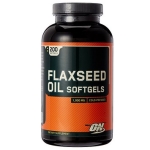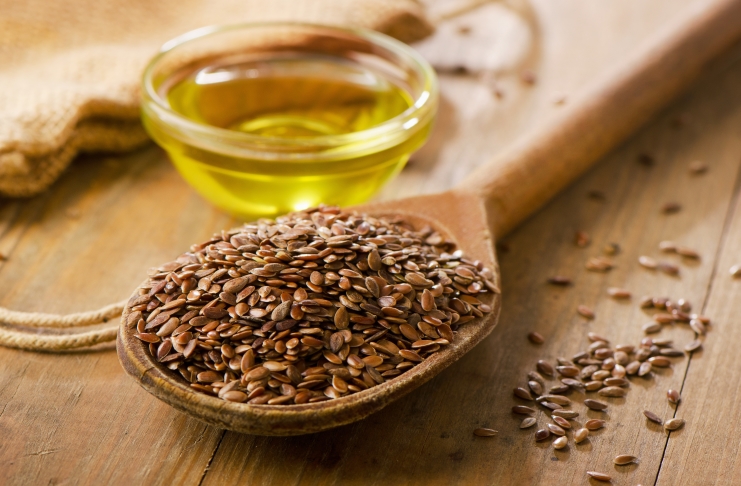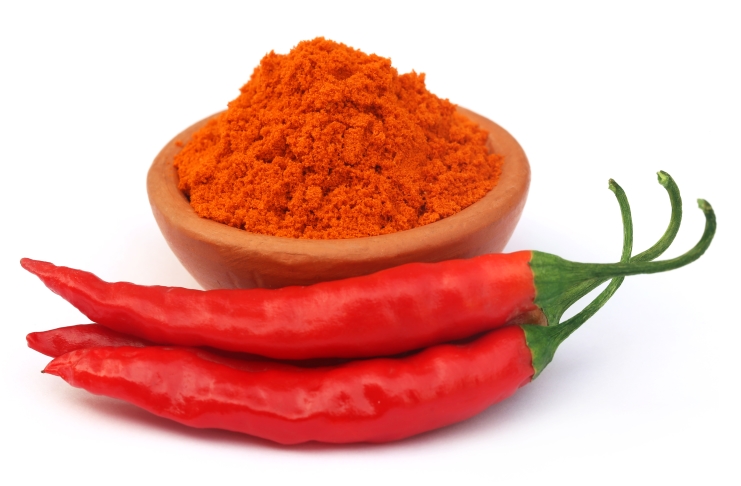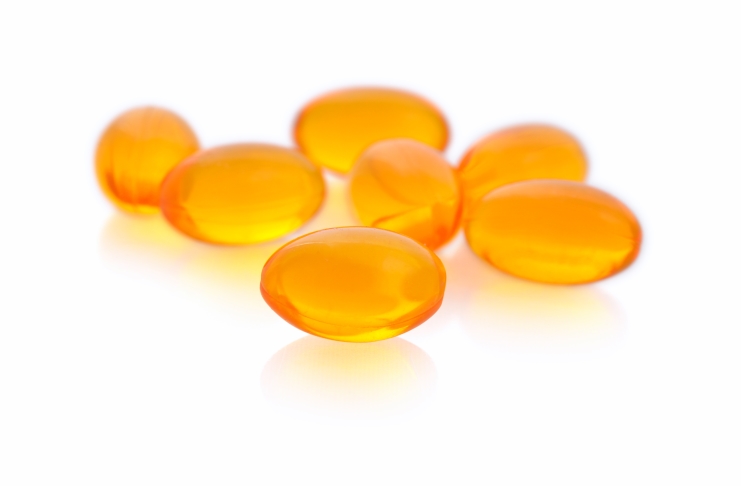Human beings need to consume the right ratio of omega 3-6-9 in our diets to maintain proper health throughout the body. Flaxseed oil has one of the most balanced essential fatty acid profiles of any food on the planet. This oil helps to restore balance in people who consume too much fat from cooked and refined fast foods, and makes for a great dietary staple for those who’re choosy about the fat sources they consume.
Over half the fat flaxseed oil contains comes in the form of unrefined alpha linoleic acid (plant based omega-3s), which are extremely important for maintaining a healthy metabolism and keeping our heart and organs free of disease. For this reason, flaxseed oil is a healthy and affordable way to make sure you’re getting enough essential fatty acids (EFAs) in your diet.
Top 5 Flaxseed Oil Supplements
 |
 |
 |
 |
 |
|
| Brand | Jarrow Formulas View on Amazon |
Optimum Nutrition View on Amazon |
Barlean’s Organic View on Amazon |
Barlean’s Organic Veiw on Amazon |
NatureWise View on Amazon |
| Overall Rating | 5 / 5 | 5 / 5 | 4.9 / 5 | 4.8 / 5 | 5 / 5 |
| Serving Size | 15ml | 1 Softgel | 15ml | 12g | 1 Softgel |
| Price/Serving | $0.57 | $0.35 | $0.89 | $0.64 | $0.07 |
| Effectiveness | 5 / 5 | 5 / 5 | 4.8 / 5 | 4.7 / 5 | 5 / 5 |
| Quality | 5 / 5 | 5 / 5 | 4.8 / 5 | 4.7 / 5 | 5 / 5 |
| Taste | 5 / 5 | 5 / 5 | 4.5 / 5 | 4.7 / 5 | 5 / 5 |
| Digestibility | 5 / 5 | 5 / 5 | 5 / 5 | 5 / 5 | 5 / 5 |
Rich in Alpha Linoleic Acid
The majority of the benefits enjoyed by people who consume flaxseed oil is due to the 57% a-linoleic acid (ALA) it contains. The high percentage of this fatty acid that flax contains makes it one of the richest sources found in nature. ALA is used by the body as a precursor in the formation of eicosapentaenoic acid (EPA), which is then converted into docosahexaenoic acid (DHA).
Note: DHA is the most preferred source of omega-3s because it doesn’t have to be converted, but it’s only found in animal sources, primarily fish. Not good if you’re a vegan or trying to keep your mercury levels as low as possible!
In the end, whether converted from the ALAs like those found in flaxseed oil, or directly from animal sources, DHA is essential for human and mammal metabolism. It’s used in the formation of new tissue everywhere in the body, including the skin and hair, and is one of the most powerful antioxidants that keep our circulatory system and organs healthy, free from disease and cancer.
Difference Between Flaxseed Meal and Flaxseed Oil
There is, unfortunately, some valuable nutritional benefits that are lost when the oil is extracted from the flaxseed. However, I believe this to be more of a benefit than a loss.
There are two nutritional factors that are eliminated when flaxseed oil is taken from the seed:
1. Fiber: Flaxseed is loaded with fiber, perhaps more fiber per tablespoon than any other plant food product (though please don’t quote me on that!) Ground flaxseed contains nearly 3 grams of fiber per tablespoon, making it one of the easiest ways to get your daily dose of colon-cleansing fiber.
2. Lignans: Lignans are a double-edged sword when consumed by humans. They’re a phytochemical that’s proven to help reduce heart disease, cancer and osteoporosis. However, it’s hard to consider adding more lignans to the diet when they’re also a potent estrogenic that may cause a host of other health issues including breast development in men. Strangely, research has shown more lignans may be beneficial to women suffering from estrogen dependent breast cancer (source).
The tradeoff of losing the fiber is certainly worth going with the oil instead of the whole seed, in my opinion. Though if you simply can’t do without the extra fiber and don’t find that the extra lignans in your diet cause you distress, get yourself some fresh, non-ground seeds (they’re cheap at bulk food stores) and a cheapo coffee grinder and eat some fresh flax instead.
If you are gluten-free like me, you can use flaxseed flower as a substitute for wheat (see how to make flaxseed flour). It’s delicious, carb-free and has a less ravaging impact on thyroid and immune function than wheat gluten does.
Flaxseed Oil Benefits
All the benefits below are due to the increase in ALAs in one’s diet and the overall balancing of a person’s EFA levels in the body.
1.Coronary Artery Disease and Other Inflammatory Conditions
The ALAs in flaxseed oil are readily converted to omega-3s, which reduce inflammation throughout the body including our heart and other organs and our joint tissues by scavenging the free radicals in our blood that cause inflammation to begin in the first place.
Inflammation is the starting point for arteriosclerosis of the heart, autoimmune diseases of the thyroid and joint tissues (ie., rheumatoid arthritis), and many other degenerative ailments.
2.Cholesterol Balancing
An increase in dietary sources of omega-3s has proven equal to prescription statins like Lipitor at reducing levels of bad (LDL) cholesterol while raising levels of the good kind (HDL). These drugs cost patients well in excess of $13 billion per year and only lower LDL cholesterol levels; they don’t treat the underlying issues that cause it such as increased triglyceride and insulin levels like a diet rich in EFAs can.
When cholesterol is balanced, blood pressure naturally lowers as the heart doesn’t have to work as hard to pump blood throughout the body and to the brain. Lower cholesterol levels in general tend to equal a lightened-risk of coronary artery disease down the road.
3.Improved Focus and Concentration
The brain is made of 60% fat. The majority of the body’s omega-3 content is contained within brain tissue. In fact, the levels of fatty acids your brain contains is one of a few key factors that can tell specialists how healthy your brain actually is (learn more). Without adequate essential fatty acid intake, the brain quickly starts to deteriorate – due to fat loss, but also rarely (in developed countries) due to deficiencies in brainy vitamins like vitamin’s A, D, E and K which need ample dietary fats to be absorbed through the gut.
Worse, the question isn’t what processes in the brain benefit most from EFAs, but really which don’t. The brain needs EFAs perhaps more than any other part of the body. Lowered omega-3 levels are also associated with anxiety and bipolar disorder, and supplements are usually recommended as part of the treatment protocol for those and other cognitive disorders including age-related dementia and Alzheimer’s (source).
4.Diabetes Symptom Treatment
Increasing the level of EFAs in the diet helps diabetics to lead a healthier life, and lowers the chances of contracting many of the long-term side effects of the disease. Diabetes, type 1 and 2, both lead to a whole slew of negative health-related symptoms that are beyond that of just having high blood sugars: eg., high LDL and low HDL cholesterol, high triglycerides, low energy levels due to insulin resistance, and increased inflammation throughout the body.
One of the first noticeable signs of diabetes is a decrease in the body’s ability to fight inflammation. As you can imagine, having learned the impact of inflammation on heart disease, autoimmunity and joint health; increased inflammation leads to many of the bad diseases we’re trying to prevent, such as heart disease and cancer. Decreases in inflammation also reduce cortisol levels which may lead to lower fasting and postprandial glucose levels.
5.Yeast Infections
The anti-inflammatory benefits of ALA after it’s been converted to omega-3 are very useful in the treatment of vaginal yeast infection. Yeast infection leads to inflammation and infection, making them very hard to control without the use of OTC and even prescription products to take them away.
Ask 10 women how they feel about the most common medical yeast infection treatments and you’re almost guaranteed to find at least 3 who’ve experienced dryness, itching and other unpleasant symptoms after taking them.
6.Natural Laxative
Flaxseed oil contains a generous dose of mucilage per serving. Mucilage helps to relax inflammation in the intestines by creating a barrier over the mucosal membranes, creating a laxative effect that’s equal to other natural laxative treatments. Mucilage-containing foods have also proven effective as a cough suppressant and is the key ingredient in all natural and some medical cough relievers.
7.Potential Weight Loss Aid
Fat fills us up more than protein. It’s also an excellent energy source when sugar levels are low in the body; a common side effect of a calorie restricted diet. All of these factors can help people lose weight since feeling satiated and energetic are two feelings that are hard for committed dieters to come by.
8.Skin and Hair Care
Flaxseed oil contains 2.4mg of vitamin E per tablespoon. When consumed, this represents 12% D.V. for our needs. When rubbed on the skin, the vitamin E and fatty oils make for a wonderful treat for your skin.
9.Uses in Cooking
You can use flaxseed oil for cooking purposes, but please don’t! Don’t cook with oils like flax, olive or coconut and instead use them to dress cold foods. Heat alters the lipids found in these oils, and not in a good way.
You may have heard about how unhealthy canola and other cheap, “fast food” oils are for your health. The cooking process changes the stability of the fats and makes them dangerous to our health. In essence, you’d be wasting your money using flax to cook with, which costs more than canola and other cheap cooking oils and will render it all but useless from a health-boosting perspective.
Read this outtake from Joseph Mercola’s post on the importance of proper omega 3-6-9 balance and how cooking destroys the healthfulness of all Essential Fatty Acids (EFAs):
“Commercial food processing destroys a significant amount of EFAs, along with their oxygenating ability… Polyunsaturated oils are unstable and very quickly become rancid. Oxidized fatty acids are dangerous to our health.
Lipid peroxidation and oxidative stress are important factors in this damage. Further damage is also caused by heating polyunsaturated fats in cooking (particularly frying foods).” (read article)
Flaxseed Warnings
1.Potential Estrogenic
The lignans in flaxseeds are a known “potential” estrogenic in some people, which can spell trouble for both sexes. In men, gynecomastia (male breast tissue growth), low testosterone levels, low sperm count and weight gain can occur if your body is sensitive to the effects. In women, too much estrogen can alter your monthly cycle, cause weight gain and a host of other potential health maladies resulting from the dysregulation of sex hormones in the body.
Luckily, most of the lignans are lost when the oil is extracted from the seed, however, enough may still be present to cause side effects in those who’re sensitive. Learn more about estrogenic foods and their side effects on Healthline.
2.Low Glucose Levels
Whenever you introduce more omega-3’s into the diet, the possibilty exists for lower blood sugar levels in diabetics and non-diabetics alike. As with most of the benefits offered by flaxseed oil, it accomplishes this feat in many people by reducing inflammation throughout the body and reducing overall stress hormone levels which can trigger hyperglycemia.
3.Low Blood Pressure
Some people have reported lower than normal blood pressure after taking flaxseed oil for a couple of weeks consistently. Lower blood pressure is a good thing and something that most of us should strive for.
However, hypotensive (low blood pressure) sufferers might find they to go too low when taking in more ALA-containing foods, Same goes if you’re taking medication to lower your blood pressure already. Discuss with your doctor before consuming large amounts if you fit into either category.
4.Allergen for Some
Flaxseeds and flaxseed oil can cause mild to severe allergies in people who’re susceptible to them. Symptoms can range from itchiness, watery eyes, hives and vomiting, to the much more severe.
Anaphylactic shock has been reported in some individuals who try foods or supplements containing flaxseeds for the first time. Consult with your allergist if you have one and ask them to do a spot test on you for flaxseed allergies if you’ve had severe allergic reactions to plants in the Linaceae before.
5.Immature Seeds
Immature seed pods have the potential to make it into any crop. They’re believed to be poisonous and should be avoided. It’s easy to identify them in a handful of flaxseeds, they’ll be light colored and not golden brown like the mature kind. When buying in oil form, all you have is the manufacturer’s reputation to go on. Poisoning symptoms, however, are rarely reported.
Keep in mind that these and other minor and serious side effects are rare, while lower blood pressure and glucose levels are in fact quite common when taking flaxseed-containing products. If you’re concerned about the potential for side effects, consult the following list on MayoClinic to see if flaxseeds or flaxseed oil is right for you.
Flaxseed Oil Supplement Reviews
Jarrow Formulas Flaxseed Oil

Jarrow gets the win with this organic flaxseed oil. They’ve gone to painstaking lengths to preserve the fatty acids contained in the oil. First, they start by cold-pressing the oil and immediately bottling it into a UV-proof container. Next, they fill the remaining airspace at the top of the container with an inert gas that prevents any possibility of harm coming to the omega fatty acids before it lands in your refrigerator.
All this and a third party organic certification make Jarrow the clear winner in this supplement category. The price is also extremely reasonable for the value the end consumer is getting, costing just under $25 for a full 32-ounce container. Though they do offer smaller sizes if you have any concerns about using an entire large bottle before the expiry date comes.
Optimum Nutrition Flaxseed Oil

ON is best known for producing the highest quality protein bodybuilding supplements on the market, so you know that you’re getting top-notch stuff whenever you purchase one of their products. Their manufacturing process is modern, using no chemicals or heat while extracting the flaxseed oil that goes into these 1000mg softgels.
If you find that consuming the oil in loose form causes unsettling heartburn and stomach upset, this ON product might just be what the doctor ordered, and then some! The 3-6-9 ratio is really nice too, offering 450mg of ALA (omega-3), 110mg of LA (omega-6) and 110mg of OA (omega-9) in each capsule. The price on this product is nice and this 200 softgel container should last just over 3 months if consuming the recommended dosage of 3 per day.
Barlean’s Organic Flax Oil

After reading the product description, you might find it hard to understand why I’m recommending a product that claims to have preserved the lignan content of the flaxseeds in this organic, cold-pressed oil. In truth, I believe this claim to be a marketing gimmick to attract people who’ve heard about the positive benefits lignans have as a phytochemical in the body.
Regardless of the method used, both fiber and lignan content are all but eliminated in flax oil. I recommend Barlean’s because they’re 100% organic and non-GMO, and they consistently produce the best nutritional supplements money can buy. The ratios of omega’s 3-6-9 are absolutely perfect for anyone looking to optimize levels of omega-3 in their diet.
Barlean’s Organic Oils Raw Energy Powder

This is another Barlean’s product. It’s not straight flaxseed oil, but this is great for people who want to get some carbohydrate energy and load up on some of their daily fiber needs at the same time. It likely contains some lignans, which might be considered a negative or a positive, depending on your outlook.
This Barlean’s Organic Oils Raw Energy Powder combines the omega-rich benefits of flax with the nutrient-dense benefits of chia seeds, then adds just the right amount of unsweetened coconut flakes for flavor. Read the label: the omega ratios are spot-on, while it’s also rich in amino acids, essential minerals, and loads of fiber in every small 1½ teaspoon-sized dose. Sprinkle this stuff on your favorite breakfast cereals or dinner salads, or add it to a smoothie for extra nutrition and fiber.
Summary
I firmly believe in getting the right ratio of omega 3-6-9 in my diet. There are few foods on the planet that deliver the level of raw alpha linoleic acid content that flaxseed oil can. Whether you choose to follow my recommendations and skip the “potentially” estrogenic ground seed in favor of the oil extract, or you want to buy and grind your own seeds, flax in either form is a highly nutritious substitute for all the gluten-containing, refined foods you’ll find at most supermarkets.
Thanks for stopping by and here’s to your good health!




